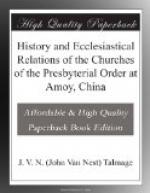The words of this third “particular” are almost (not quite) accurate. Yet they appear to us like special pleading. They would have been strictly correct if they had run as follows: “These Churches are all (why say, ’three at least’?) organized according to (not ’under’—see pages 28-30) the Constitution of our Church. Therefore it is claimed that they form a Church of our order in China, but that the members thereof are neither members of the Reformed Dutch Church here, nor members of the Presbyterian Church in England.” Such are the facts. It would have been better if the Committee had so stated them. The effort is now made to divide these churches, and make three of them a part of the Dutch Church in America.
There is one more paragraph in the report of the Committee which demands notice. It is:
“Your Committee can easily understand how reluctantly our Missionaries may have been, or may still be, to disturb, or alter, or modify the relations of the Churches at Amoy. But they conceive it to be their duty to say that feeling should never be allowed to take the place of conscience, nor to discharge its functions; and so long as our Missionaries claim to be subordinate to the authority of General Synod, they should allow this body to assume the responsibility of its chosen and deliberate policy.”
It seems to us the Committee are not much more fortunate on the subject of casuistry, than on Church “government” and “historic facts.” The Missionaries do “claim to be subordinate to the authority of General Synod,” but they also claim to be subordinate to the Supreme authority. Now suppose—we shall not be charged with insubordination for the mere supposition—suppose the Synod, through some misapprehension, should direct us to pursue a course, which, after the most mature reflection, we felt to be injurious to the cause of Christ, and consequently contrary to His will—will the fact of the Synod “assuming the responsibility” clear our skirts? Who is the Lord of conscience? General Synod? It seems to us, while the Committee conceive it to be their duty to deliver to the Missionaries at Amoy a lecture on the importance of giving heed to conscience, in the very same sentence they direct us to hold conscience in abeyance. But where did the Committee learn that their Missionaries were influenced by feelings and not by conscience, and that too in reference to the laying of the foundation of the Church of Christ in such an empire as that of China; that they felt called upon in this solemn manner to deliver such a lecture? Would such a reflection have been cast on any other body of ministers in our Church? or is it supposed that men who give themselves to the work of preaching the gospel in heathen lands are less under the influence of conscience than those who remain at home? They conceived it to be their duty! Was it?




